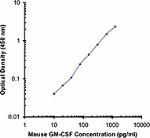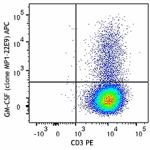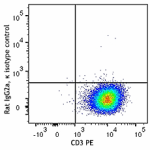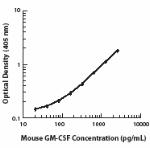- Clone
- MP1-22E9 (See other available formats)
- Regulatory Status
- RUO
- Other Names
- Granulocyte/macrophage-colony stimulating factor, CSF-α, Pluripoietin-α, Eosinophil colony stimulating factor (Eo-CSF), Burst promoting activity (BPA)
- Isotype
- Rat IgG2a, κ
- Ave. Rating
- Submit a Review
- Product Citations
- publications

-

PMA+ ionomycin-stimulated Th2-polarized BALB/c mouse splenocytes were surface stained with anti-mouse CD3ε (clone 145-2C11) APC. Cells were fixed, permeabilized, and intracellularly stained with anti-mouse GM-CSF (clone MP1-22E9) Brilliant Violet 421™ (left) or rat IgG2a, κ Brilliant Violet 421™ isotype control (right)
| Cat # | Size | Price | Quantity Check Availability | Save | ||
|---|---|---|---|---|---|---|
| 505427 | 50 µg | 200€ | ||||
GM-CSF is a hematopoietic factor that is produced by T cells, macrophages, fibroblasts and endothelial cells. This multifunctional cytokine stimulates progenitor cells of neutrophils, eosinophils, and macrophages. GM-CSF is also a differentiation and activating factor for granulocytic and monocytic cells.
Product DetailsProduct Details
- Verified Reactivity
- Mouse
- Antibody Type
- Monoclonal
- Host Species
- Rat
- Immunogen
- Yeast-expressed, recombinant mouse GM-CSF
- Formulation
- Phosphate-buffered solution, pH 7.2, containing 0.09% sodium azide and BSA (origin USA)
- Preparation
- The antibody was purified by affinity chromatography and conjugated with Brilliant Violet 421™ under optimal conditions.
- Concentration
- 0.2 mg/mL
- Storage & Handling
- The antibody solution should be stored undiluted between 2°C and 8°C, and protected from prolonged exposure to light. Do not freeze.
- Application
-
ICFC - Quality tested
- Recommended Usage
-
Each lot of this antibody is quality control tested by intracellular immunofluorescent staining with flow cytometric analysis. For flow cytometric staining, the suggested use of this reagent is ≤ 0.25 µg per million cells in 100 µL volume. It is recommended that the reagent be titrated for optimal performance for each application.
Brilliant Violet 421™ excites at 405 nm and emits at 421 nm. The standard bandpass filter 450/50 nm is recommended for detection. Brilliant Violet 421™ is a trademark of Sirigen Group Ltd.
Learn more about Brilliant Violet™.
This product is subject to proprietary rights of Sirigen Inc. and is made and sold under license from Sirigen Inc. The purchase of this product conveys to the buyer a non-transferable right to use the purchased product for research purposes only. This product may not be resold or incorporated in any manner into another product for resale. Any use for therapeutics or diagnostics is strictly prohibited. This product is covered by U.S. Patent(s), pending patent applications and foreign equivalents. - Excitation Laser
-
Violet Laser (405 nm)
- Application Notes
-
ELISA or ELISPOT Capture1,3-5: The purified MP1-22E9 antibody is useful as the capture antibody in a sandwich ELISA or ELISPOT assay, when used in conjunction with the biotinylated MP1-31G6 antibody (Cat. No. 505502) as the detecting antibody. The LEAF™ purified antibody is suggested for ELISPOT capture.
Flow Cytometry8: The fluorochrome-labeled MP1-22E9 antibody is useful for intracellular immunofluorescent staining and flow cytometric analysis to identify GM-CSF -producing cells within mixed cell populations.
Neutralization2-4: The MP1-22E9 antibody can neutralize the bioactivity of natural or recombinant GM-CSF. The LEAF™ purified antibody (Endotoxin <0.1 EU/µg, Azide-Free, 0.2 µm filtered) is recommended for in vivo and in vitro neutralization (Cat. No. 505408).
Additional reported applications (for the relevant formats) include: immunohistochemical staining of paraformaldehyde-fixed, saponin-treated frozen tissue sections1,6,7, and immunocytochemistry8. -
Application References
(PubMed link indicates BioLegend citation) -
- Sander B, et al. 1993. J. Immunol. Methods 166:201.
- Suda T, et al. 1990. Cell. Immunol. 129:228.
- Nozaki S, et al. 1991. J. Invest. Dermatol. 97:10.
- Abrams JS, et al. 1992. Immunol. Rev. 127:5.
- Abrams JS. 2001. Curr. Protoc. Immunol. Unit 6.20.
- Sander B, et al. 1991. Immunol. Rev. 119:65.
- Andersson U, et al. 1999. Detection and quantification of gene expression. New York:Springer-Verlag.
- Larkin J, et al. 2006. J. Immunol. 177:268.
- RRID
-
AB_3662370 (BioLegend Cat. No. 505427)
Antigen Details
- Structure
- Cytokine; 22 kD (Mammalian)
- Bioactivity
- Growth/development granulocyte/macrophage progenitors; differentiates myeloblasts/monoblasts; synergizes with Epo proliferation of erythroid/megakaryocytic progenitors
- Cell Sources
- T cells, monocytes/macrophages, fibroblasts, endothelial cells, mast cells
- Cell Targets
- Granulocyte/macrophage/erythroid/megakaryocytic progenitors, myeloblasts, monoblasts
- Receptors
- Heterodimer GM-CSFR α subunit (CDw116); β-subunit (CDw131) in common with IL-3R, IL-5R
- Biology Area
- Cell Biology, Stem Cells
- Molecular Family
- Cytokines/Chemokines, Growth Factors
- Antigen References
-
1. Fitzgerald, K., et al. Eds. 2001. The Cytokine FactsBook. Academic Press, San Diego.
2. Demetri, G., et al. 1991. Blood 78:2791.
3. Fan, D., et al. 1991. In vivo 5:571.
4. Negrin, R., et al. 1992. Adv. Pharmacol. 23:263. - Regulation
- Synergistic with IL-1, IL-3, G-CSF; E21R competitive antagonist for receptor binding; stored in ECM with heparan sulfate proteoglycans
- Gene ID
- 12981 View all products for this Gene ID
- UniProt
- View information about GM-CSF on UniProt.org
Related FAQs
- What is the F/P ratio range of our BV421™ format antibody reagents?
-
It is lot-specific. On average it ranges between 2-4.
Other Formats
View All GM-CSF Reagents Request Custom Conjugation| Description | Clone | Applications |
|---|---|---|
| FITC anti-mouse GM-CSF | MP1-22E9 | ICFC |
| PE anti-mouse GM-CSF | MP1-22E9 | ICFC |
| Purified anti-mouse GM-CSF | MP1-22E9 | ELISA Capture,ELISPOT Capture,Neut,ICC,IHC-F |
| PerCP/Cyanine5.5 anti-mouse GM-CSF | MP1-22E9 | ICFC |
| APC anti-mouse GM-CSF | MP1-22E9 | ICFC |
| PE/Cyanine7 anti-mouse GM-CSF | MP1-22E9 | ICFC |
| Ultra-LEAF™ Purified anti-mouse GM-CSF | MP1-22E9 | ELISA Capture,ELISPOT Capture,Neut,ICC,IHC-F |
| PE/Dazzle™ 594 anti-mouse GM-CSF | MP1-22E9 | ICFC |
| APC/Fire™ 750 anti-mouse GM-CSF | MP1-22E9 | ICFC |
| Pacific Blue™ anti-mouse GM-CSF | MP1-22E9 | ICFC |
| Brilliant Violet 421™ anti-mouse GM-CSF | MP1-22E9 | ICFC |
Compare Data Across All Formats
This data display is provided for general comparisons between formats.
Your actual data may vary due to variations in samples, target cells, instruments and their settings, staining conditions, and other factors.
If you need assistance with selecting the best format contact our expert technical support team.
-
FITC anti-mouse GM-CSF
-
PE anti-mouse GM-CSF

PMA+ionomycin-stimulated BALB/c mouse T cells surface were s... -
Purified anti-mouse GM-CSF

-
PerCP/Cyanine5.5 anti-mouse GM-CSF

PMA+ Ionomycin-stimulated Th2-polarized C57BL/6 splenocytes ... -
APC anti-mouse GM-CSF

PMA+ Ionomycin-stimulated Th2-polarized BALB/c splenocytes w... 
-
PE/Cyanine7 anti-mouse GM-CSF

PMA+ Ionomycin-stimulated Th2-polarized BALB/c splenocytes w... -
Ultra-LEAF™ Purified anti-mouse GM-CSF

-
PE/Dazzle™ 594 anti-mouse GM-CSF

Cell Activation Cocktail-stimulated Th2-polarized C57BL/6 sp... -
APC/Fire™ 750 anti-mouse GM-CSF

Cell Activation Cocktail-stimulated Th2-polarized C57BL/6 sp... -
Pacific Blue™ anti-mouse GM-CSF

Cell Activation Cocktail-stimulated Th2-polarized C57BL/6 sp... -
Brilliant Violet 421™ anti-mouse GM-CSF

PMA+ ionomycin-stimulated Th2-polarized BALB/c mouse splenoc...
 Login / Register
Login / Register 















Follow Us